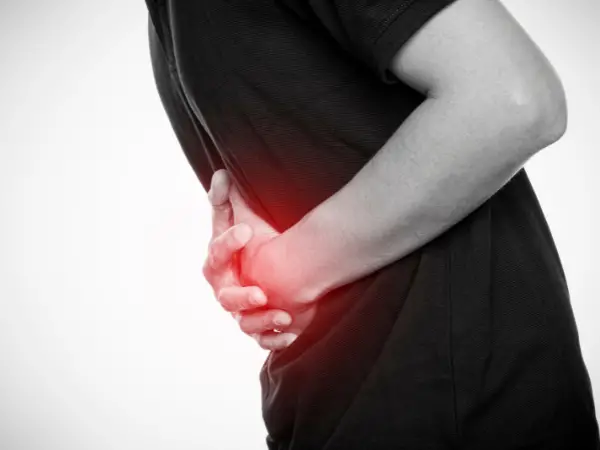For some, coffee can lead to uncomfortable bloating. If you often feel gassy or swollen after your morning cup, you’re not alone. We will explore the reasons why coffee might cause bloating.
Does Coffee Make You Bloated?
Understanding how coffee affects your body can help you find a solution. We’ll look at the digestive process and common symptoms of coffee-related bloating.
Understanding The Digestive Process
The digestive process is complex. It starts in the mouth and ends in the intestines. When you drink coffee, your body reacts in several ways that can lead to bloating.
Coffee increases stomach acid. This can speed up digestion but also cause irritation. Here are key points about how coffee affects digestion:
- Increased Acid Production: Coffee stimulates stomach acid, which can lead to discomfort.
- Gastric Motility: Coffee speeds up the movement of food through the stomach.
- Dehydration: Caffeine can act as a diuretic, leading to less water in your body.
- Food Sensitivity: Some people are sensitive to coffee, leading to digestive issues.
Understanding these effects can help you manage bloating. Knowing how coffee interacts with your body is essential for your digestive health.
Common Symptoms Of Coffee-related Bloating
Many people experience symptoms from coffee. These symptoms can vary but often include:
- Bloating: A feeling of fullness or swelling in the abdomen.
- Gas: Accumulation of air in the stomach or intestines.
- Stomach Pain: Discomfort or cramps in the stomach area.
- Heartburn: A burning sensation in the chest due to acid reflux.
Being aware of these symptoms is crucial. If coffee causes discomfort, consider reducing intake or switching to alternatives. Finding what works for your body is key to feeling better.
5 Reasons Coffee Might Cause Bloating
Understanding the reasons coffee might cause bloating can help you enjoy your favorite drink without discomfort. Here are 5 reasons coffee might cause bloating.
Acidity And Stomach Irritation
Coffee is naturally acidic. This acidity can irritate the stomach lining. For some, this leads to bloating. The discomfort comes from increased stomach acid production. It can also lead to acid reflux. Here are some signs of stomach irritation:
- Burning sensation in the stomach
- Nausea
- Gas and bloating
To reduce acidity and irritation, consider:
- Choosing low-acid coffee brands
- Adding a pinch of baking soda to your brew
- Drinking coffee with food instead of on an empty stomach
These changes can help minimize discomfort and enjoy your coffee better.
Caffeine’s Effect On Gut Motility
Caffeine affects gut motility, the movement of food through the digestive system. It can speed up digestion for some people. For others, it may cause irregularities. This can lead to bloating.
Consider how much caffeine you consume:
| Type of Coffee | Caffeine Content (mg) |
|---|---|
| Espresso (1 shot) | 63 |
| Drip Coffee (8 oz) | 95 |
| Instant Coffee (8 oz) | 60 |
Adjusting your caffeine intake can help. Try switching to decaf or limit your daily cups. This may ease bloating.

Dairy And Added Sugars: Hidden Triggers
Many coffee drinks contain dairy and sugars. These ingredients can contribute to bloating. Lactose intolerance is common. It affects digestion. Symptoms include:
- Gas
- Bloating
- Diarrhea
Added sugars also affect your gut. They can lead to fermentation, causing gas. Consider these options:
- Try almond, soy, or oat milk instead of dairy.
- Choose unsweetened versions of flavored coffee.
- Limit syrup and sugar in your drinks.
These changes can reduce bloating significantly.
Artificial Sweeteners And Gas Production
Many people use artificial sweeteners in coffee. Common options include aspartame and sucralose. While they are low in calories, they can cause bloating. These sweeteners can lead to gas production.
Consider these alternatives:
- Use natural sweeteners like honey or agave.
- Gradually reduce the amount of sweeteners.
- Switch to stevia, which is often easier to digest.
Choosing the right sweeteners can help you enjoy coffee without discomfort.
Dehydration And Its Impact On Digestion
Caffeine is a diuretic. It can lead to dehydration if consumed in large amounts. Dehydration affects digestion. It can slow down your digestive process. This slowdown can cause bloating and discomfort. Signs of dehydration include:
- Dry mouth
- Thirst
- Dark urine
To stay hydrated, drink water throughout the day. Consider limiting coffee to avoid dehydration. Balance your coffee intake with water to help digestion.
How To Identify Your Bloating Triggers
Finding out what causes your bloating can help you enjoy your coffee without the discomfort. Here are some methods to help you pinpoint your triggers.
Keeping A Food And Symptom Journal
Keeping a food and symptom journal is a practical way to understand your bloating triggers. Write down everything you eat and drink, including your coffee. Note the times you consume these items and any symptoms you feel afterward.
Here are some tips for keeping your journal:
- Record meals and snacks daily.
- Include beverages, especially coffee.
- Note the time of day for each entry.
- Write down any symptoms, including bloating, gas, or discomfort.
- Track your mood and stress levels; they can affect digestion.
Your journal may look like this:
| Date | Food/Beverage | Time | Symptoms |
|---|---|---|---|
| 10/1 | Coffee with milk | 8:00 AM | Bloating |
| 10/1 | Toast | 8:30 AM | No symptoms |
Review your journal weekly. Look for patterns. If you notice bloating after specific foods or drinks, you may have found your triggers.

Elimination Diets: A Step-by-step Approach
An elimination diet can help you find out what causes your bloating. This process involves removing certain foods and drinks from your diet for a short time. After a few weeks, reintroduce them one at a time.
Follow these steps for an elimination diet:
- Choose foods to eliminate. Common ones include:
- Dairy products
- Gluten
- Processed sugars
- Caffeinated drinks
- Remove these items from your diet for 2-4 weeks.
- After the elimination period, reintroduce one item at a time.
- Wait 3 days before adding another food.
- Keep a journal during this process to track any symptoms.
This method helps identify which foods cause bloating. It requires patience and attention but can provide valuable insights into your body.
Identifying Specific Ingredients: Lactose, Sweeteners, Etc.
Specific ingredients in coffee can cause bloating. Common culprits include lactose in dairy, artificial sweeteners, and certain flavorings. Identifying these can help you make better choices.
Start by considering the ingredients you add to your coffee:
- Lactose: Found in milk and cream. If you feel bloated after using these, try lactose-free options.
- Sweeteners: Artificial sweeteners like sorbitol and xylitol can cause bloating for some people. Try using natural sweeteners instead.
- Flavorings: Flavored coffee syrups may contain additives that upset your stomach. Check labels for ingredients.
Consider eliminating these ingredients one by one. Track your symptoms to see if any improvements occur. You may find a simple change makes a big difference.
How To Enjoy Coffee Without Bloating
Many people love coffee, but some find it causes bloating. This discomfort can make your morning routine less enjoyable. Here are some tips to keep your coffee experience pleasant and bloating-free.
Choosing Low-acid Coffee Varieties
One major reason for bloating is the acidity in coffee. High-acid coffee can irritate your stomach. This irritation may lead to gas and bloating. To avoid this, opt for low-acid coffee varieties. Here are some options:
- Arabica beans – Naturally lower in acidity.
- Cold brew – This method produces a smoother, less acidic coffee.
- Dark roast – Roasting longer reduces acidity levels.
It’s important to read labels carefully. Look for brands that specifically mention low acidity. Here’s a quick comparison table of different coffee types:
| Type of Coffee | Acidity Level | Recommended for Bloating |
|---|---|---|
| Arabica | Low | Yes |
| Robusta | High | No |
| Cold Brew | Low | Yes |
| Dark Roast | Medium | Yes |
Choosing the right coffee can make a big difference. Low-acid varieties allow you to enjoy your coffee without discomfort.
Adjusting Your Coffee Consumption
How you drink coffee matters. Changing your consumption habits can help reduce bloating. Here are some tips:
- Limit intake to one or two cups per day.
- Drink coffee slowly. Enjoy every sip.
- Avoid drinking coffee on an empty stomach.
Consider the temperature of your coffee. Hot coffee can irritate your stomach more than warm or room-temperature coffee. Also, try to avoid adding too much sugar. Sugar can contribute to bloating. Instead, use natural sweeteners like:
- Stevia
- Honey
- Agave nectar
Pay attention to how your body reacts. Keep a diary of your coffee habits and symptoms. This can help you find a balance that works for you.
Alternatives To Dairy: Plant-based Milks
Dairy can cause bloating in many people. If you use milk in your coffee, consider switching to plant-based options. These alternatives are often easier to digest. Here are some popular plant-based milks:
- Almond milk
- Oat milk
- Coconut milk
- Soy milk
Each type of milk has its benefits. For instance:
| Type of Milk | Calories (per cup) | Protein (grams) | Digestibility |
|---|---|---|---|
| Almond Milk | 30 | 1 | Easy |
| Oat Milk | 120 | 3 | Moderate |
| Coconut Milk | 50 | 0.5 | Easy |
| Soy Milk | 80 | 7 | Moderate |
Experiment with different types of plant-based milk. Find one that complements your coffee and satisfies your taste buds. Enjoy your coffee without the discomfort of bloating.

